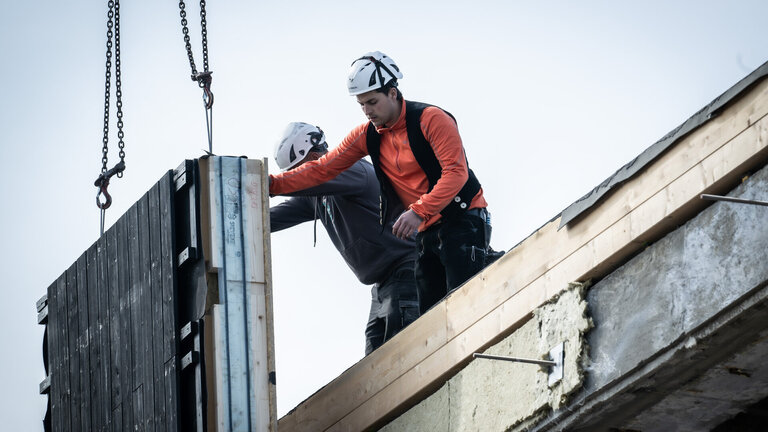Too complex, too expensive and too slow: For years, the renovation rate in Germany has been stagnant at around one percent. The German Energy Agency (dena) is therefore promoting serial renovation in Germany on behalf of the German Federal Ministry for Economic Affairs and Climate Action (BMWK) using the Energiesprong model. This innovative concept combines digital design with industrial prefabrication and standardized solutions, and considerably accelerates and simplifies the renovation process. Following the successful launch of the program for residential buildings, dena is now extending the serial renovation approach to non-residential buildings., such as schools, accommodation and office buildings. Drees & Sommer, which specializes in advice on construction and real estate, and Capgemini Invent, Capgemini Group's global powerhouse for digital innovation and transformation issues, support dena with consulting services around market introduction.
Buildings in use are a major source of harmful emissions in Germany. At least two percent of existing buildings should undergo modernization every year if climate neutrality is to be achieved by 2045. However, the country’s renovation rate is actually falling: retrofitting had been completed on no more than 0.72 percent (1) of existing buildings as at the end of 2023 – even fewer than in the previous year. It is clear that the huge need for renovation will never be met at this rate. David Kreulitsch, project head at Drees & Sommer, explained: “Standardization, prefabrication and reduction of construction time on sites through serial renovation can help. Serial renovation based on the Dutch Energiesprong principle is among the key concepts that will have to be considered as an alternative to conventional renovation. Serial renovation is not only quicker, but also offers the opportunity to give consideration to matters such as urban mining and circular economy principles. For instance, construction modules can be designed in accordance with circular principles, so they can be prefabricated systematically in a way that conserves resources.”
Serial Renovation Already Being Used Successfully in Residential Buildings
Energiesprong is an innovative renovation concept that is based on digital design, industrial prefabrication and standardized processes. Large modules such as façade, roof or technical components are prefabricated in production facilities and tailored to the specific building. Digital design by means of a 3D building scan enables tailored scheduling of individual elements and detailed planning of the sequence of the construction work. This makes the renovation process as a whole quicker than a conventional modernization and saves costs.
Timo Sengewald, who is part of dena’s Energiesprong team and is responsible for serial renovation of non-residential buildings explained: “We have already used the Energiesprong model successfully in a number of residential real estate projects, with more than one hundred further projects currently being implemented or in planning. The results are impressive: the renovated buildings achieve energy savings of between 80 and 90 percent, and the modernization work takes a significantly shorter time. The approach thus offers the opportunity to speed up the renovation of existing buildings in Germany and quickly raise the renovation rate to more than one percent.” dena’s next step is to extend the approach to non-residential buildings. Pilot projects will include the renovation of accommodation, office, administration and school buildings. He continued: “The backlog of German schools requiring modernization is huge. The Energiesprong model enables renovations to be carried out while the school is occupied, and over a significantly shorter period. The high degree of standardization means the work is also more economical than in conventional renovations.”
Serial Renovation Gains Traction in Germany
For a successful market preparation and introduction strategy regarding non-residential buildings, dena has taken the consulting companies Drees & Sommer and Capgemini Invent on board to support them. The brief includes analysis of the portfolio of the German Institute for Federal Real Estate (BImA), and identification and prioritization of pilot projects. Additionally, it involves the development of strategic and efficient renovation scenarios for public non-residential buildings, taking into account key cost parameters. The assignments also comprise the provision of continuous support with regard to the implementation of pilot projects, up to the preparation of building contracts and construction. Jonas Vogel, consultant at Capgemini Invent commented: “The Energiesprong model is gathering momentum in Germany. For many market participants, the concept is completely new, while others are delaying due to the very tight current market situation. So, until the concept is fully established, what is important is to work hard to persuade people and build up expertise in the market.” Together with Drees & Sommer, Capgemini supports dena in this task. Both companies have in-depth expertise. Drees & Sommer has a lot of experience from many building renovations and from drawing up energy policies, as well as from modular construction and using the building information modeling (BIM) method. Capgemini Invent concentrates on strategy and transformation consulting, with the emphasis on sustainability.
Serial renovation is also receiving attention at EU and federal German level. In its Renovation Wave initiative, the EU Commission cites the Energiesprong approach as the ideal model, and since 2021 the German Federal Ministry for Economic Affairs and Climate Action has been supporting serial renovation through a funding program. Drees & Sommer’s and Capgemini Invent’s assignment for the supervision of the pilot project for non-residential buildings for dena runs until summer 2025.
1: Media release of the Association for Energy Efficient Building Envelopes (BuVEG) of December 8, 2023: https://www.cleanenergywire.org/news/urgent-action-needed-speed-energy-efficient-building-renovation-sector-association
